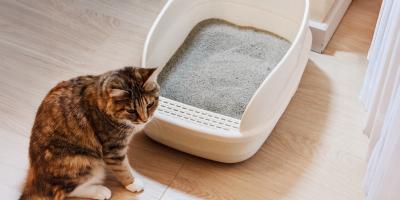Why Does My Cat Sleep on Me?


There might not be anything better than having your kitten fall asleep on you, a warm body all snuggled up tightly. Some owners love sharing the bed, while others find their cats to be unwanted overnight guests. In this article, we’ll explain why humans can be a cat’s preferred lounging spot, what your cat is trying to tell you, and the pros and cons of having your cat sleep with you.
5 Reasons Why Your Cat Lies on You
Your cat might choose you as their preferred place to snooze due to several different reasons:
- Warmth: Cats have a high body temperature, around 101 degrees Fahrenheit. They like to be warm and are naturally drawn to a human body’s warmth. Some hairless breeds, like Sphynx cats, might be even more inclined to do it.
- Affection: Sleeping on you could be your cat’s love language. Some breeds, like Ragdolls, love being with their owners, contrary to the popular belief that cats are independent. If they sleep on you, they trust you. It’s also a way to bond.
- Marking you with their scent: Cats have scent glands on their bodies, and they use them to mark their territory. Sleeping on you might be how they register a comforting and familiar scent.
- Security: If your cat sleeps on you, chances are they see you as a safe space. This allows them to rest more deeply and be less on alert.
- Comfort: Human heartbeats and breaths can be comforting to cats. They like snuggling up next to you the same way they would have with their mother and littermates.
What Does it Mean When a Cat Always Sleeps on a Specific Part of My Body?
There are many spots on your body that a cat may prefer depending on their personality and your sleep style. We don’t know for sure why cats choose the spots they do, but we do have some best guesses. Here are some of the most common places a cat might choose to lie on when it’s lights out.
Why Does My Cat Sleep on My Chest?
Cats might love chests because they bring them closer to your breathing lungs and beating heart. The rhythm of these two organs working might be comforting to them, and your chest is likely a warm spot. It might also make them feel safe and secure to be this close to you.
Why Does My Cat Sleep on My Head?
Your head is another spot that could feel comforting to a cat. Human heads release heat and move less than other parts of our bodies when we sleep, so a cat might be drawn to it for those reasons. Your cat might also like the way your hair smells.
Why Does My Cat Sleep Between My Legs?
The area between your legs is warm and cozy, which might make a cat feel secure. Soft legs allow them to get close in a nest-like setting.
Why Does My Cat Sleep on My Feet?
Feet are a popular place for a cat nap because it’s a one-two punch – a place where they might feel connected to you, but not one where they might be trapped. Sleeping on your feet can allow for an easy exit if they need it.
Why Does My Cat Sleep on My Neck?
Cats might sleep on your neck because they are seeking a warm and familiar spot close to you. It might also be because they can hear your heartbeat and breathing easily there.
Pros and Cons of Sleeping with Your Cat
Some owners might see co-sleeping as a bonding opportunity, while others might be annoyed by the invasion of space. Here’s what to consider when thinking about having a cat sleep on you or next to you:
Pros of Sleeping with a Cat
- Bonding: Cats are notoriously independent, which can be hard for some cuddlier owners. If a cat chooses to sleep with you, they are showing they trust you.
- Comfort: Cats seek you out for comfort. Knowing this can make for a cozy night of sleep.
- Stress relief: Petting your cat releases oxytocin. That can reduce stress and promote relaxation for better sleep.
Cons of Sleeping with a Cat
- Allergies: If you are sensitive to cat allergens, having your cat that close to you for a long period might make things worse, despite the obvious bonding opportunity. Consider putting your cat on an allergy-reducing cat food, such as Pro Plan LiveClear.
- Disrupted sleep: While the idea of sleeping with a cat might sound nice, in reality, cats can be more active at night and don’t follow the same sleep cycles humans do. Their activity could cause you to wake up more.
- Tossing and turning: Larger cats or those who insist on sleeping on your head might make for a bunch of tossing and turning all night long.
- Hygiene: Litter from the litter box might get into your bed if you have indoor cats. Outdoor cats could bring in all sorts of diseases, bugs, or parasites.
How to Train a Cat to Sleep in Its Own Bed
Co-sleeping isn’t for everyone. If you want to get your cat to sleep somewhere else at night, such as their own bed, follow these steps:
- Choose a comfortable spot. A cozy cat bed that is suited to your cat’s preferences is appealing. Your cat might want a covered bed to feel more snug and secure, or a heated one for warmth. They might also want to sleep in an elevated space, such as a cat bed at the top of a cat tree.
- Be consistent. Try not to move your cat’s bed around the house. It should be in a quiet and safe area that the cat enjoys being in, such as your bedroom.
- Make it inviting. Some cats respond well to you jazzing up their space – give them familiar or favorite toys and blankets with your scent to make it a more appealing space.
- Use positive reinforcement. Reward your cat with treats or praise when they stay in their bed. Be patient when training them; it won’t happen overnight, especially with breeds that want to be close to you or with kittens.
- Get into a bedtime routine. Cats thrive on routines, so create a bedtime one that includes them. It will help let them know that it’s time to wind down and get ready for bed.
Frequently Asked Questions About Cat Sleeping
Why Does My Cat Sleep Under the Bed?
Your cat might be sleeping under the bed because it is a warm, safe space close to you. They might find it to be cozy and relaxing. There is also a possibility that your cat is anxious, especially if other symptoms are being displayed. If you think this is the case, call your vet.
Why Does My Cat Sleep on My Clothes?
Your cat might be sleeping on your clothes because they are comforted by the familiar scent of you. This can be true whether you are away or at home. Clothes can also be warm and soft, making them a nice place to curl up. Additionally, it can be a territorial behavior in cats; they might be trying to “claim” you by marking you and your belongings with their scent.
Why Does My Cat Twitch in His Sleep?
Just like humans, cats go through rapid-eye movement (REM) sleep, a deeper, more restorative cycle of sleep. During it, cats might twitch in their sleep. There is usually nothing to worry about; in fact, they might be dreaming! Call your vet if the twitching is prolonged, frequent, or accompanied by any other symptoms such as vomiting, diarrhea, or changes in appetite.
Conclusion
Sleeping together can be a wonderful way for you and your cat to bond. When they sleep on you, they are showing you deep trust and affection. However, it’s not for everyone as it can be disruptive to human sleep, given how active cats can be at night and how much quality sleep you might need. If you want them to sleep in a bed, it’s possible to do so and keep a strong bond through positive reinforcement, consistency, and patience.
For more expert tips on caring for your cat, explore our other cat routine care articles.

Earn myPurina Rewards with Every Purchase
Use your points for treats, toys, and gift cards with myPurina app.



